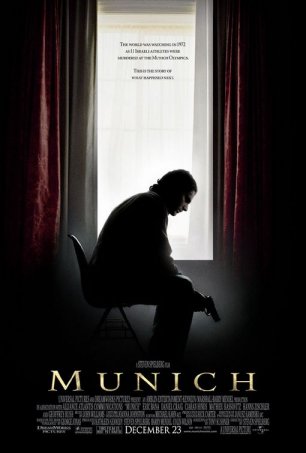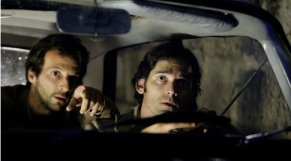|
Munich
Steven
Spielberg has delivered. His profound take on the sci-fi
genre in the Tom Cruise starring vehicle War
of the Worlds pales in comparison to Munich,
and in many ways, everything the director has ever touched
seems to be fair game for re-evaluation. Munich could
very well be the director’s defining moment.
Where
War of the Worlds entertained, the film still succumbed
to the usual Spielbergian trappings by retreating back into
safe, family friendly territory before the closing credits.
Anyone who has seen the film knows the moment that spoiled
the fun.
Munich
seemed ripe for one such moment. In fact, with his track
record it’s a wonder Spielberg didn’t allow
the film to veer off into that all too saccharine world
full of schmaltz and happy endings.
And
with touchy subject matter like the Israel’s response
to the Black September attack on the Israeli team in the
Munich Olympic compound in 1972, one wrong step for the
director could have spelled disaster.
Fortunately
for everyone involved, Spielberg had his approach for the
film fully fleshed out, and what audiences will find is
a thought provoking, unrelenting look at the methods used
by modern governments to combat terrorism. For those quick
on the uptake, this does entail allusions to September 11th,
but that isn’t all that Munich is.
To frame
his statement, Spielberg tells the story of a young Israeli
intelligence officer named Avner Kauffman (Eric Bana) who
is tapped by a Mossad officer named Ephraim (Geoffrey Rush)
to embark on an extremely important mission in the wake
of the Munich massacre. Avner is instructed to join four
other men to form a hit squad, charged with hunting down
a list of suspected Black September masterminds behind the
tragedy.
They
are instructed to leave all family and contacts behind and
work outside of the government in anonymity. For Avner,
this means leaving behind his pregnant wife and mother to
serve a country he has always felt and sense of dedication
towards. Employing the most classic of Spielberg thematic
devices, we are given evidence that Avner’s father
also served as a Mossad officer, which meant being away
from home for long stretches of time, at one point imprisoned
while serving his country.
This
of course suggests that Israel has become a surrogate father
for Avner, but suffice it to say, this is not overstated
or played at the levels of cheese that it could have been.
In fact, Avner’s own issues with impending fatherhood
provide a subtle enhancement of the theme, endearing at
the darkest of moments, providing a perfect blend of affection
and sheer dread.
Avner
is given strict instructions with a detailed list of names
to eradicate and nothing more. As the hit squad sets to
work tracking down their targets and making contacts for
information, they slowly begin doubting the underlying purposes
behind their mission, and the means with which they are
instructed to carry out their mission.
It is
probably wise to refrain from digging into too many intricacies
as far as plot and message are concerned because a film
as important as this is worth discovering. However, Spielberg’s
approach to the film is nearly as vital as the subject matter
at hand. Taking place in 1972, the film actually lends a
look and feel as familiar as any entry from that time period.
Cinematographer
Janusz Kaminski, who has worked with Spielberg several times
before including on Schindler’s List, paints
with seventies genre clichés without ever allowing
the line of forced inference to be encroached upon.
Sure,
anyone can select a film stock with more grain for effect,
but everything from framing to shot choice is spot on in
recreating the tone necessary to make the film feel grounded
in the past. Even the editing work in both the film and
sound departments helps to flesh this aspect out to a greater
degree.
Take
for example a sequence in which a bomb has been rigged underneath
the mattress of a target and members of the hit squad are
stationed outside waiting for the sign to trigger detonation.
As Avner is stationed inside the hotel, waiting to send
out the signal, Steve (Daniel Craig) is waiting in the car,
all the while singing “Papa Was a Rolling Stone”
in a nervous yet subdued manner.
Cross
cutting between events occurring all around, the sequence
loses its footing, weaving creepily into a chilling spiral
of tension and urgency. It is nearly reminiscent of some
of the aural experimentations found in Francis Ford Coppola’s
The Conversation.
Munich
is the result of a filmmaker with a message firing on all
cylinders. Sure, he may have knocked one out of the park
with War of the Worlds, but still managed to fall
short in the tail end of the third act of that film. Here,
Spielberg manages to refrain from such dalliances, delivering
a film as good, if not better, than anything he has ever
offered before.
Rating:

|








